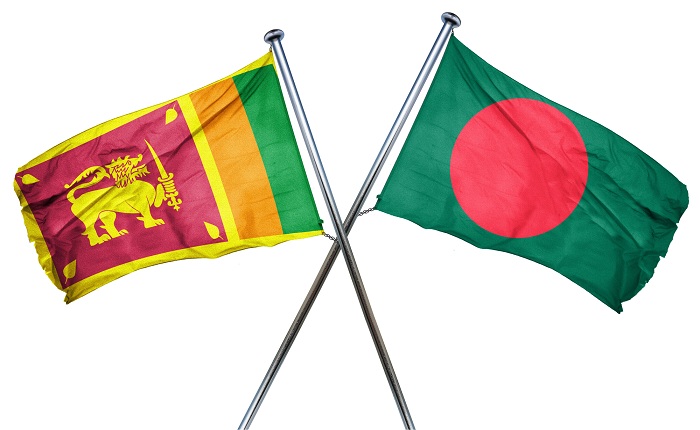March 7, 2017 Reading Time: 3 minutes

Reading Time: 3 min read
Image Credit – ellandar / depositphotos
While bilateral trade and investment ties are still underdeveloped, both countries can coordinate more closely in reviving regional institutions like BIMSTEC.
This instalment of the Spotlight Series features an interview with Professor Rashed Uz Zaman, of the University of Dhaka, conducted by Barana Waidyatilake, Research Fellow at LKI, on ‘Sri Lanka-Bangladesh Relations: Room to Grow?’. LKI hosted Professor Zaman on 31 August 2016.
Professor Rashed Uz Zaman has been teaching at the Department of International Relations at the University of Dhaka since 1998. He holds a bachelor’s and master’s degree in International Relations from the University of Dhaka. He also obtained a master’s in Security Studies from the University of Hull, and a PhD in Strategic Studies from the University of Reading, United Kingdom. In 2009-11, Prof. Uz Zaman was an Alexander von Humboldt post-doctoral research fellow at the University of Erfurt, Germany. He was a Fulbright Visiting Professor in the Department of Political Science at Vanderbilt University, USA, in 2012. Prof. Uz Zaman works on strategic and international security issues and has spoken and written extensively on Bangladesh in UN peacekeeping missions.
His publications include a chapter on Bangladesh and UN peacekeeping missions in Paul Williams and Alex J. Bellamy (eds.), Providing Peacekeepers: The Politics, Challenges and, Future of United Nations Peacekeeping Contributions (Oxford: Oxford University Press, 2013). His article ‘Bangladesh’s Participation in UN Peacekeeping Missions and Challenges for Civil-Military Relations: A Case for Concordance Theory’ was published in International Peacekeeping, Volume 21, No. 3, 2014. Another article ‘South Asian Regionalism and UN Peacekeeping Missions: A Case of ‘and Never the Twain Shall Meet’?’ has been published in Journal of International Peacekeeping, Volume 19, Nos. 3-4, 2015. He can be reached at rashed@du.ac.bd
See below for the interview with Prof. Uz Zaman.
Mr. Waidyatilake: Sri Lanka and Bangladesh share important historical and cultural links, with Sri Lanka’s Sinhala community tracing their origins to Bengal. In your opinion, what role do such links play in Sri Lanka-Bangladesh relations?
Prof. Uz Zaman: Sri Lanka and Bangladesh relations is still at a very nascent stage despite their close geographic proximity. Although both the countries share historical and cultural links, it is the contemporary context of issues that dominate their bilateral relations.
Mr. Waidyatilake: In April 2016, Bangladesh objected to Sri Lanka’s claim to extend its continental shelf beyond 200 nautical miles. What is at stake for both countries in their continental shelf claims, and how do you think this issue might be resolved?
Prof. Uz Zaman: One of the areas of contention between the two countries is in maritime border delimitation issues. As Sri Lanka proposes to expand its continental shelf, it may contradict Bangladesh’s claim in the zone. As Bangladesh has successfully defended its maritime boundary delimitation claims with Myanmar and India, so will it again in this case. According to the latest reports in the media, Bangladesh is already preparing to do so at the United Nations forums.
Mr. Waidyatilake: Should Indian Ocean region (IOR) countries like Bangladesh and Sri Lanka urge India to do more to promote security in the IOR?
Prof. Uz Zaman: In this age of new regionalism and specially with the difficulty that SAARC is experiencing, it is time that states like Sri Lanka and Bangladesh work together to revive institutions like Indian Ocean Rim Association and the Bay of Bengal Initiative for Multi-Sectoral Technical and Economic Cooperation (BIMSTEC). While India could play an important role in providing security for the Indian Ocean region, it would be prudent to keep the level playing field open for all. This region is gradually gaining global strategic significance with the American tilt to the Indo-Pacific region and its proclamation of America’s emerging “Pacific century” where strategic cogitations must be derived at with a cost and benefit analysis. Over-reliance on one power may impinge on the greater benefit for the future.
Mr. Waidyatilake: Bangladesh and Sri Lanka both have disputes with India over natural resources (river waters for Bangladesh and fisheries for Sri Lanka). In your opinion, could Bangladesh and Sri Lanka work together to promote the resolution of such issues at the regional level?
Prof. Uz Zaman: In terms of resolving regional problems with regard to natural resources with India, I believe bilateralism would prevail as has been demonstrated in the past.
Mr. Waidyatilake: Despite trade links between Bangladesh and Sri Lanka increasing in recent years, both countries have stated that current trade volumes are significantly below their potential. In what sectors could Bangladesh and Sri Lanka easily enhance their trade, and do you think a Free Trade Agreement would be a possibility in the near future?
Prof. Uz Zaman: Bilateral trade is one area where the relationship could flourish. Both the countries are taking official steps to establish a Free Trade Area. Bangladesh is seeking the removal of tax barriers on some specific items including pharmaceutical items, which are yet to be responded by Sri Lanka. However, investment from Sri Lanka in Bangladesh is on the rise. Bilateral trade, overall, is taking a positive turn.
END.
*The opinions expressed in this transcript are the interviewee’s own views and are not the institutional views of LKI.